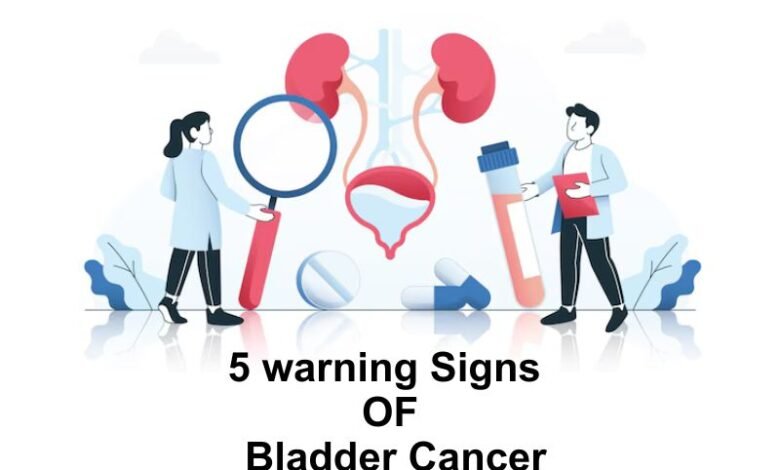
Bladder cancer is a serious condition that originates in the cells lining the bladder. It often begins in the urothelial cells, which are responsible for the bladder’s ability to store urine. Early detection of bladder cancer treatment is crucial for successful and outcomes. However, its symptoms can sometimes be subtle and may resemble other less serious urinary issues, making awareness of the warning signs vital for early diagnosis. Here, we explore the five key warning signs of bladder cancer, which can help individuals seek medical attention in a timely manner.
1. Blood in the Urine (Hematuria)
One of the most common and significant warning signs of bladder cancer is the presence of blood in the urine, also known as hematuria. This symptom often appears without any pain or discomfort, which can make it easy to overlook. Hematuria can manifest in two ways: gross hematuria (visible blood in the urine) and microscopic hematuria (blood that can only be detected under a microscope).
- Gross Hematuria: This type of hematuria is visible to the naked eye, and the urine may appear pink, red, or even brownish. The blood may not always be continuous, meaning it can come and go, and sometimes it may be present only during certain urinations.
- Microscopic Hematuria: In this case, the blood is not visible but can be detected during a routine urine test. Although microscopic hematuria is not always indicative of bladder cancer, it warrants further investigation to rule out the possibility of cancer or other urinary tract issues.
Hematuria can also occur due to conditions other than bladder cancer, such as urinary tract infections (UTIs), kidney stones, or bladder infections. However, when blood in the urine appears without any apparent cause or persists over time, it should raise concern and be evaluated by a healthcare provider.
2. Frequent Urination
Frequent urination, also known as pollakiuria, can be a warning sign of bladder cancer, especially if it occurs along with other symptoms such as blood in the urine. Individuals may experience the sensation of needing to urinate more often than usual, even if the amount of urine passed is small. This urge may occur both during the day and at night (nocturia), and it can disrupt daily life.
Increased frequency of urination may be accompanied by a feeling of urgency, which is the strong, uncontrollable urge to urinate. This can be particularly concerning if it interferes with one’s ability to maintain regular routines or leads to accidents due to the inability to hold urine. While frequent urination can be caused by a variety of factors such as UTIs, diabetes, or overactive bladder, when it occurs without an obvious cause and is persistent, it may suggest a more serious underlying condition like bladder cancer.
3. Pain or Burning Sensation During Urination
Pain or a burning sensation during urination, also known as dysuria, is another potential warning sign of bladder cancer. This symptom is often linked to infections or urinary tract issues, but when it occurs alongside other symptoms such as blood in the urine or changes in urination habits, it may be indicative of bladder cancer.
The pain may be sharp or a dull ache in the bladder area, and it can be aggravated by the act of urination. It may also persist after urination has finished. Dysuria is generally caused by inflammation in the bladder, which can occur due to cancerous growths within the bladder. While bladder infections and stones are more common causes of painful urination, when the symptom is recurring or unexplained, it should be investigated.
In some cases, people with bladder cancer may also experience pelvic pain, which may not necessarily be related to urination but can be a result of tumors pressing on nearby organs. Pain in the lower abdomen or pelvis can also be a sign that the cancer has spread or is affecting surrounding tissues.
4. Back Pain or Abdominal Pain
Back pain, particularly in the lower back, can be a symptom of bladder cancer, especially when the tumor grows and spreads to nearby tissues, such as the kidneys or spine. This pain may be dull or aching, and in some cases, it can be severe enough to cause discomfort while sitting, standing, or lying down.
Abdominal pain, particularly in the lower abdomen or pelvis, can also be indicative of bladder cancer. This pain may occur when a tumor obstructs the normal functioning of the bladder or when the bladder becomes distended. The pain might increase as the bladder fills with urine, and it may become more noticeable when attempting to empty the bladder.
Back and abdominal pain can be symptoms of various conditions, so it is important to monitor whether the pain is persistent or worsens over time. If the pain is accompanied by other warning signs, such as blood in the urine or changes in urination patterns, it may suggest that cancer has spread or is affecting surrounding organs.
5. Unexplained Weight Loss and Fatigue
Unexplained weight loss and fatigue are more general symptoms that can be associated with various cancers, including bladder cancer. As the body fights the cancer, it may lead to a decrease in appetite, poor digestion, and a general sense of weakness or tiredness. Weight loss in bladder cancer can occur without changes in diet or exercise, and it can be a sign that the body is not absorbing nutrients as efficiently as it normally would.
Fatigue, which is an overwhelming sense of tiredness or lack of energy, can be caused by a variety of factors, including anemia (low red blood cell count), which is common in cancer patients. Bladder cancer can lead to internal bleeding due to the tumors, which may result in anemia and contribute to fatigue. In addition, cancer treatments such as chemotherapy or radiation can also cause significant tiredness and a decrease in energy levels.
Although weight loss and fatigue can be symptoms of many illnesses, when these signs occur alongside more specific urinary symptoms (such as blood in the urine, pain, or changes in urination frequency), they should prompt further evaluation for possible cancer.
When to Seek Medical Attention
If any of the warning signs mentioned above are observed, it is crucial to consult a healthcare provider as soon as possible. Early detection and diagnosis can significantly improve the chances of successful treatment for bladder cancer. Bladder cancer may be diagnosed through various tests, including urine tests, cystoscopy (a procedure to look inside the bladder), imaging studies like CT scans, and biopsies.
While the symptoms of bladder cancer can be indicative of other, less serious conditions, they should never be ignored. A healthcare provider will be able to evaluate the symptoms, perform appropriate diagnostic tests, and determine the best course of action.
Conclusion
Bladder cancer is a serious condition that can affect individuals of all ages, but it is more common in older adults and smokers. The five warning signs discussed — blood in the urine, frequent urination, pain during urination, back or abdominal pain, and unexplained weight loss and fatigue — are important to watch for, as they can indicate the presence of bladder cancer. Early detection is key to improving survival rates and the effectiveness of treatment, so if you experience any of these symptoms, seek medical attention promptly.
Read more – (click here)


